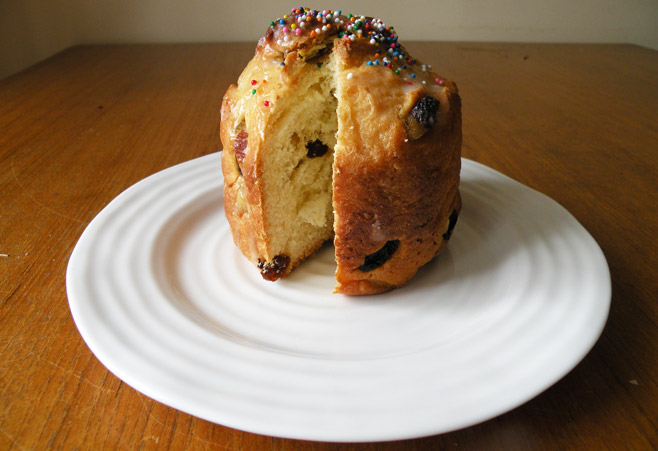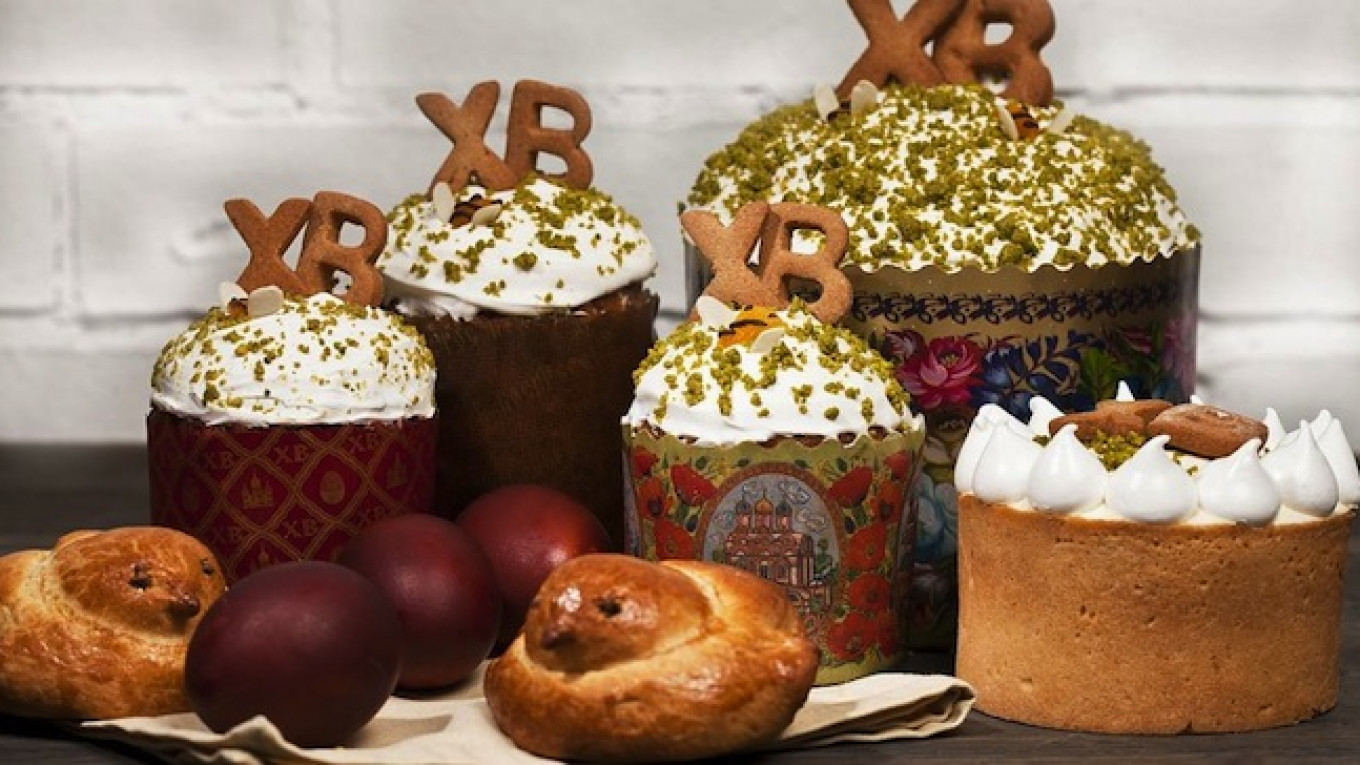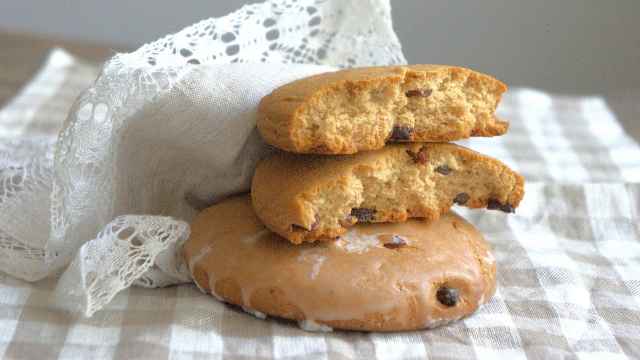Kulich, the Russian answer to the hot cross bun, occupies center stage on the Orthodox dining table from Easter to Pentecost.
The tradition of fasting during Lent may have died out for all but the hardiest of Orthodox believers, but that's no reason to abandon the feast. Stuffed with candied fruits, almonds and flavored with saffron and cardamom, this semi-sweet bread should suffice to satiate the cravings of Lent.
The origin of the kulich's cylindrical shape is the subject of debate. Some consider its iced "crown" to mimic the snow-covered dome of an Orthodox church. Others believe the bread to be shaped like a priest's hat.
Traditionally, priests bless loaves of kulich brought to the Easter vigil, which begins just before midnight on Holy Saturday and stretches into the early hours of Easter Sunday. Eaten between Easter and Pentecost, the blessed bread is consumed before breakfast and any unblessed leftovers are served as a dessert with Paskha, a sweet cheese. In some households — as well as in all the bakeries in Moscow — kulich entirely replaces bread for the duration of Holy Week.
The initials ХВ adorning the loaf stand for Христос воскрес — Christ is Risen. With any luck, the kulich will be too. As one traditional Russian saying goes, "if the cake rises well and comes out okay, the family's going to be all right, if the dough doesn't fit in the oven or the crust cracks, you should expect misfortune."
According to Alexei Nemeryuk, head of the Department of Trade and Services of Moscow, more than 800 tons of kulich will be sold in Moscow during the Easter holidays. More than 20 types of kulich will be available, ranging in size from 100 grams to 1 kilogram, and ranging in price from 39 rubles ($0.50) to 300 rubles ($5), although a kulich from one of the city's high-end bakeries is likely to set you back a little more.

The Volkonsky bakery chain offers kulich of 600 grams (850 rubles) and 1.1 kilograms (1,700 rubles) as well as a variety of chocolate eggs and the cheesecake-type dessert paskha. wolkonsky.com
The Anderson chain of family cafes will have several types of kulich. A child-sized kulich with a figure of a chick runs 320 rubles ($5) and full-sized (700 gram) kulich, are available with nuts for 620 rubles or with nuts and dried fruit for 860 rubles. The cafe also has decorated Easter egg-shaped cookies for 160 rubles. cafe-anderson.ru
French bakery import Paul, part of the Ginza Project set of restaurants, is offering kulich and the paskha loaf to go with it. A 540-gram kulich is 690 rubles and a 500-gram paskha is 650 rubles. ginza.ru/msk/news/9801
The popular Bulka chain has three kulich on its menu, all topped with pistachio nuts and cookies. The smallest one is a bargain at 140 rubles for 120 grams. Add 40 grams for 40 rubles to get a medium-sized cake, 160 grams, for 180 rubles. The large, 600-gram kulich, is 650 rubles. bulkabakery.ru
Recipe DIY
Edible Easter Kulich

Kulich is a classic Russian Easter cake, made with butter, eggs and dried fruit to highlight the abundance of the season. However, many kulich are really too dry to be enjoyable. By the time they are eaten, they have been sitting out for days, waiting their turn to be blessed by an Orthodox priest. Or, in truth, perhaps they were never made with enough butter to begin with. The secret, it seems, is to use lots of butter and knead the bread really well. If you do that, your kulich should have a light texture while retaining a buttery, brioche-like richness.
To get the classic kulich height, use clean coffee tins or tomato cans. But whatever you do, make sure to line your chosen cake molds with parchment paper on the bottom and up the sides, so that you can be sure to get the cakes out again!
Ingredients:
375 ml (1 1/2) cups warm milk
20g (6 tsp — yes, really!) active dry yeast
30 ml (6 tsp) rum
80g (1/2 cup) raisins
750g (6 cups) flour
5 eggs, at room temperature
200g (1 cup) sugar
250g (1 cup) butter, at room temperature
1 tsp vanilla extract or vanilla sugar
50g (1/2 cup) dried fruit
Icing:
1 egg white
250g (2 cups) icing sugar
1 teaspoon lemon juice
Makes 2 large kulich
Preparation:
1. Place the yeast in half a cup of warm milk with a half a teaspoon of sugar and let it sit 10 minutes to proof.
2. Pour the rum over the raisins and let sit.
3. Mix one cup of the flour with one cup of milk and mix well. Add in the yeast, which should have risen quite a lot by now. Mix again well and let rise in a warm place for 30 minutes.
4. Separate the egg whites from the yolks. Whisk the yolks with the sugar for several minutes until the mixture is pale. Pour in the vanilla and rum that was sitting with the raisins.
5. In a separate bowl, whisk the whites with a pinch of salt until foamy.
6. Mix the yolks into the yeast mixture, then carefully fold in the egg whites a bit at a time, being careful not to deflate them too much.
7. Then sift the flour into the dough until you have a dough that doesn't stick to your hands but isn't dry.
8. Knead for around 10 minutes until you have a smooth dough, adding more flour as needed to keep the dough from sticking to your hands and the countertop.
9. When everything is smooth, add the butter a bit at a time, kneading well after each addition.
10. After this, move the dough to a clean buttered bowl. Cover with plastic wrap and let rise in a warm place for 1 1/2 hours.
11. When the dough has roughly doubled in size, move it to a floured work surface and roll out to about an inch thickness. Add the raisins and dried fruit and knead again well to distribute the fruit throughout.
12. Put the dough into your baking molds about 1/2 full and cover with a wet towel for about an hour, until the dough rises almost to the top of the molds.
13. While the kulichi are rising, preheat your oven to 180° C (350°F). Put the cakes in the oven for 45-60 minutes until a wooden skewer in the middle comes out clean.
14. Take the kulichi out of the oven, let rest 5 minutes and then unmold.
15. Now make the icing: Mix the egg white with the powdered sugar and lemon juice until it is reasonably thick, yet spreadable. When the cakes are completely cool, spread with icing and top with round sprinkles or slivered almonds. Enjoy! С Пасхой!
A Message from The Moscow Times:
Dear readers,
We are facing unprecedented challenges. Russia's Prosecutor General's Office has designated The Moscow Times as an "undesirable" organization, criminalizing our work and putting our staff at risk of prosecution. This follows our earlier unjust labeling as a "foreign agent."
These actions are direct attempts to silence independent journalism in Russia. The authorities claim our work "discredits the decisions of the Russian leadership." We see things differently: we strive to provide accurate, unbiased reporting on Russia.
We, the journalists of The Moscow Times, refuse to be silenced. But to continue our work, we need your help.
Your support, no matter how small, makes a world of difference. If you can, please support us monthly starting from just $2. It's quick to set up, and every contribution makes a significant impact.
By supporting The Moscow Times, you're defending open, independent journalism in the face of repression. Thank you for standing with us.
Remind me later.






